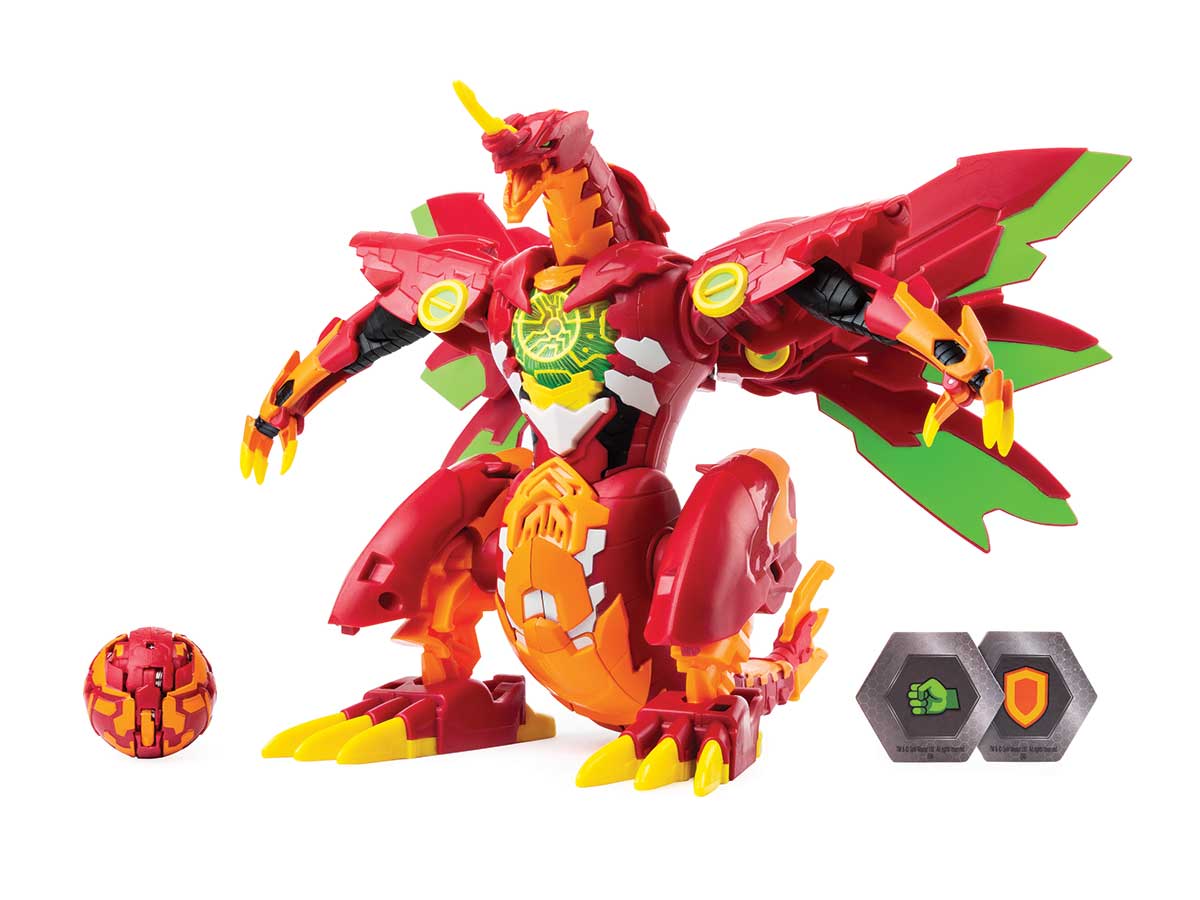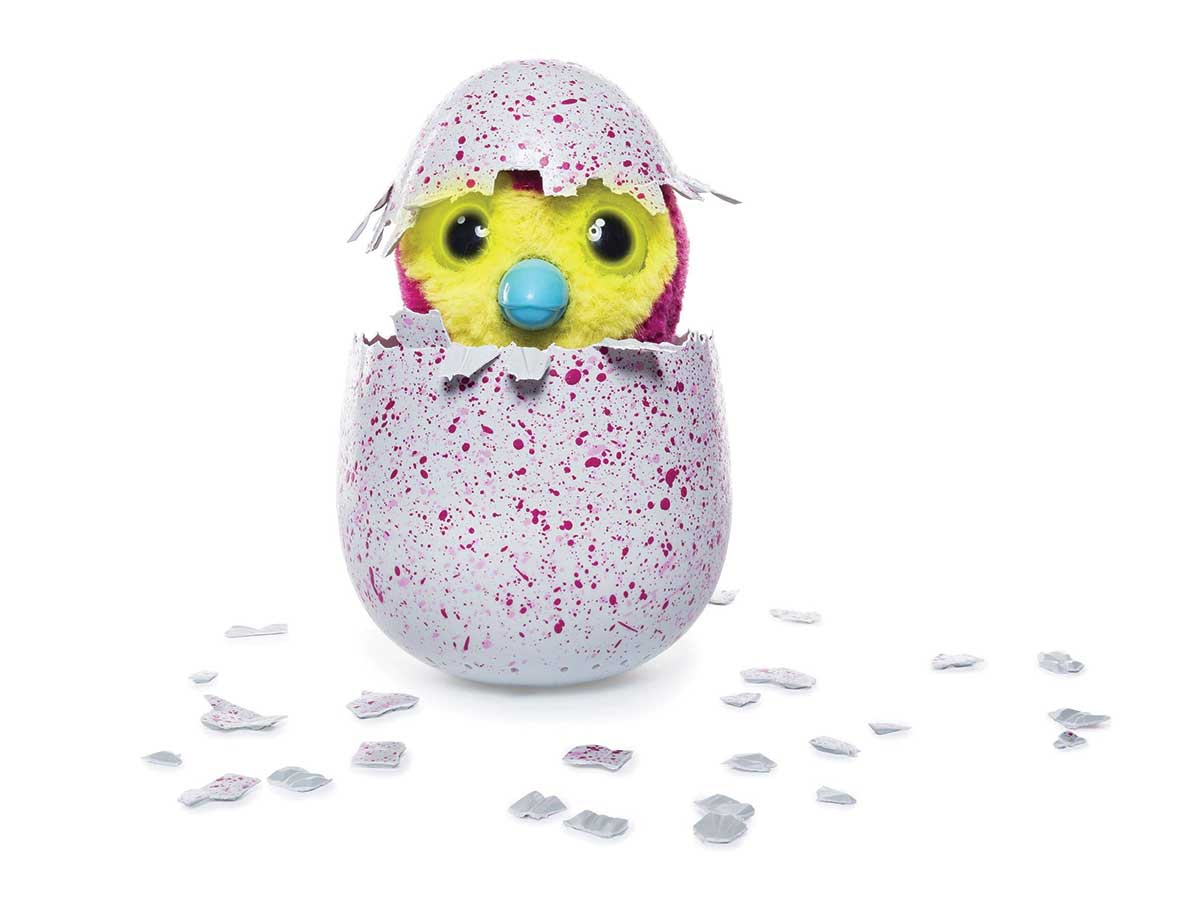
The CPA who saved Canada’s biggest toy company
 Ben Gadbois, global president and chief operating officer of Spin Master (Photograph by Daniel Ehrenworth)
Ben Gadbois, global president and chief operating officer of Spin Master (Photograph by Daniel Ehrenworth)
Spin Master’s headquarters are everything you’d imagine a toy company’s offices to be. The seven-storey suite, in a downtown Toronto office tower, is still brand new—Spin Master has only been there since June. Floor-to-ceiling illustrations of the company’s products adorn cerulean walls and there are toys everywhere: perched on the dividers between cubicles, sealed in vitrines for public display and strewn about in a special room called the Toy Box, where staff and visitors can cuddle giant Paw Patrol plushes or shake hands with a waist-high Meccanoid robot. T-shirt-clad engineers mingle with preppy marketing pros in a sleek corporate cafeteria where a giant rainbow-coloured mural of the word “play” is made up of hundreds of thousands of Bunchems, Lego-like building toys that look like psychedelic cockleburs.
Just about the only corner of the complex that isn’t completely festooned with toys is the office of chief operating officer Benoit Gadbois, where the decor is spare and modern. Gadbois’s personal appearance matches his surroundings. When we met, his tuft of sandy hair was combed neatly atop a clean-shaven face that would have looked severe if it weren’t so frequently lightened by laughter.
When Gadbois, a CPA, joined the company in 2012, Spin Master was in a bind. Five years earlier, the company had launched Bakugan, a line of Transformer-like toys that start as marble-sized plastic spheres and then, when they come in contact with a magnetic surface, pop open into palm-sized creatures like Dragonoid, a red dragon with a narwhal-esque nose horn. The toys, which Spin Master co-developed with Japan’s Sega Toys, are addictively fidgety, with spring-loaded limbs and hidden latches that make each one as beguiling as a miniature Chinese puzzle. A Bakugan collectible card game turned the toys into game pieces. An associated anime TV series, which Spin Master co-produced, made the brand into a household name around the world. Bakugan was one of the biggest toy fads of 2008 and 2009. By 2010, largely because of the runaway success of Bakugan, Spin Master’s gross product sales were approaching $1 billion—nearly double the company’s 2007 take.
Then the fad began to subside. Aging fans complained about the simplicity of the card game, the TV show wrapped its fourth season and the plastic figures languished on store shelves. The effect on Spin Master’s balance sheet was dramatic. By 2012, the company’s sales had slid back to pre-Bakugan levels, but its staffing and global infrastructure hadn’t been reduced accordingly, and there were no new products in its development pipeline that seemed poised to match Bakugan’s success. Gadbois’s mission, from day one of his job as COO, was to repair the damage and help Spin Master grow again.
 Paw Patrol: This original Spin Master brand—including a TV show, touring live show and toys—is currently one of the most successful children’s entertainment franchises in the world (Courtesy of Spin Master)
Paw Patrol: This original Spin Master brand—including a TV show, touring live show and toys—is currently one of the most successful children’s entertainment franchises in the world (Courtesy of Spin Master)
Now, at age 48, Gadbois has largely achieved that goal. While it still trails North American toy industry giants like Mattel or Hasbro, whose annual net revenues are frequently in excess of US$5 billion, Spin Master is on the rise. In the past seven years, the company has redoubled efforts to develop original intellectual property, allowing it to produce toys tied to mass-market TV shows to which it controls the licensing rights. The crowning achievement of this strategy is Paw Patrol, an enormously popular animated show about heroic puppies. Spin Master developed the concept in-house, based on a pitch from an independent children’s TV creator named Keith Chapman, then produced the series in partnership with Nickelodeon. As of 2017, Paw Patrol was the number one preschool toy property in the U.S., as measured by the market research firm NPD.
Flush with cash from its 2015 IPO, the company has embarked on an expansion spree, opening distribution hubs in countries like Poland and Russia. Its new global reach allows it to compete for major third-party licensing deals, a huge source of revenue in the toy industry. In 2018, Spin Master managed an impressive coup: the company reached an agreement with Warner Bros. to produce a number of toys based on DC Comics characters, licences that were previously held by Mattel.
Spin Master has even begun swallowing parts of other companies. In 2013, it acquired Meccano, which gave it a beachhead in the perennially lucrative world of construction toys. Among its more recent acquisitions is Gund, the plush-toy brand, which it bought from the giftware distributor Enesco for a consideration value of US$79.1 million.
In 2017, Spin Master’s gross sales were the highest they’ve ever been: US$1.74 billion. In the three years since the IPO, its net income has nearly quadrupled, to just over US$161 million in 2017. With Gadbois’s help, Spin Master has transformed itself from a company whose fate seemed tied to one-off hits into a genuine behemoth à la Mattel or Hasbro, with several flagship brands that are poised to deliver rich returns for years to come. By adopting a longer-term view and cultivating product lines that can be managed over time—strategies championed by the COO—the company has bought itself some relief from the toy industry’s unpredictability.
Now what? Considering all that Gadbois and Spin Master have done to bounce back, their new move seems counterintuitive: they’re relaunching Bakugan, the trendy toy that fizzled out and almost took the company down with it. Throughout 2019, kids around the world will be bombarded with new Bakugan toys and a revamped TV show. With Gadbois on its team, can Spin Master stick the landing this time?
Children are fickle: remember when they all needed fidget spinners—until suddenly they didn’t?
Toys are a remarkably stable industry. The conventional wisdom among analysts and executives is that toy spending remains resilient even in depressed economic conditions. And the growing popularity of video games—Sony introduced the PlayStation in 1994, the same year Spin Master was founded—hasn’t supplanted toys either. “I think parents will cut in a lot of other places before they cut back on buying toys for their children, particularly in the key buying seasons,” says Joan Ramsay, an entertainment industry analyst at NPD, which pegs the toy industry’s total worldwide sales at about $40 billion. “Nothing is recession-proof, but toys are a pretty strong bet.”
At a micro level, meanwhile, the toy industry can be wildly unpredictable. Children are fickle (remember when they all needed fidget spinners, until suddenly they didn’t?), and it’s rare for any particular product line to stay successful for more than a few years before its pint-sized fanbase grows out of the trend.
The industry’s biggest players have evergreen properties that grow and evolve with the changing tastes of young consumers, like Mattel’s Barbie and Hot Wheels lines. These toys don’t require constant reinvention, only brand management: a new career for Barbie, say, or a Hot Wheels car with a fresh look.
But evergreen properties are the exception, not the norm. Companies that don’t replace tired product lines may find themselves flirting with extinction. The industry’s favourite cautionary tale is Coleco, the fabled maker of Cabbage Patch Kids, one of the most popular toys of the early 1980s. In 1988, having failed to plan adequately for the end of the Cabbage Patch fad, Coleco filed for bankruptcy.
When Bakugan’s popularity began to wane, Spin Master could have fallen victim to this same boom-and-bust pattern. One of the reasons it didn’t was Ben Gadbois.
 Bakugan: These shape-shifters dominated the toy market in the late 2000s, nearly doubling Spin Master’s revenues over a three-year span (Courtesy of Spin Master)
Bakugan: These shape-shifters dominated the toy market in the late 2000s, nearly doubling Spin Master’s revenues over a three-year span (Courtesy of Spin Master)
Raised in Montreal (he still has a noticeable Québécois accent), Gadbois moved to the Boston area as a teenager when his father, a general manager for the paint company Sico, was transferred there. “I didn’t speak any English and I figured that would be an opportunity to learn it and check out the United States,” Gadbois says.
On the advice of his father, who believed knowing financial fundamentals was key to understanding business, Gadbois decided to pursue accounting. He rose quickly through the corporate world, first as a senior auditor for Arthur Andersen (“They kindly asked me to leave,” Gadbois says. “They thought I was maybe a little too loud”) and then as an internal auditor for Black and Decker. He earned his accounting designation in 1995. Later, at Newell Rubbermaid, Gadbois took on a series of CFO roles before being made president of Rubbermaid’s Europe, Middle East, Africa and Asia wing at just 31 years old. By 2012, he had been promoted to global president of Newell Rubbermaid’s writing and creative expression division, whose flagship brand is Sharpie, a permanent marker so ubiquitous in North America that it easily dominates its market category.
“He is probably one of the strongest strategic business leaders that I’ve ever worked with,” says Krista DiBerardino, who has worked under and with Gadbois at both Newell Rubbermaid and Spin Master, where she is the executive vice-president of marketing integration and activation. “His ability to see the vision and then set the operational discipline to execute on it is a rare skill.”
Gadbois was considering a move to a CEO position in private equity. “I was very close to signing a contract, until I got a call from Anton Rabie, one of the founders of Spin Master,” Gadbois recalled. “He was so persistent that I finally flew in.” Gadbois had breakfast with Ronnen Harary, another Spin Master founder and Rabie’s co-CEO. “We just hit it off.”
Gadbois joined the company as COO that August. One of his first tasks was leading a wave of layoffs—never a good look for a new boss. With that done, it was time to find a way to put the company back on a path to growth. It wasn’t going to be easy.
“Innovation drives value. Everything we do has to empower the creative process.”
Spin Master’s leadership structure is uncommon among corporations of its size and reach: the three original co-founders—Rabie and Harary, the two co-CEOs, and Ben Varadi, the company’s executive vice-president and chief creative officer—are still involved in the day-to-day. Rabie had a knack for strategic leadership and working with people; Harary had his hands on the entertainment and licensing side of the business; and Varadi had a nose for the creative side and new product, but none of them had ever managed a billion-dollar company.
Though the founders had hired Gadbois to shake things up, he knew that to implement changes, he would have to win over not only a board of directors, but also the triumvirate who had nurtured the company from nothing. “They were always humble enough to know what they’re great at and where they need help,” Gadbois says. “It took a little bit at the beginning, because it was somewhat radical, what we needed to do. But I think ultimately they realized that in order for us to scale the company for the future, we needed to change some things.”
Gadbois aligned Spin Master leadership behind a restructuring plan that split company operations into a series of units, each devoted to a particular aspect of the business (e.g., robotics, preschool, outdoor). Each unit had its own team, responsible for its own budget. This new structure allowed each part of Spin Master’s business some creative autonomy, but also made each unit accountable for its own results, linking freedom with consequences. Functions that were needed by all the business units, like marketing and legal, were centralized so that they could be shared across the company, eliminating redundancy.
But selling toys isn’t like selling Sharpies. The toy industry’s relentless trend cycle means even the most efficient manufacturer can still founder if it fails to bring enough innovative new products to market to make up for the losses incurred by older product lines as they begin to fade. A toy company is only as good as its next hit.
“When you come to Spin Master, you have to pause and understand how the value gets created at this company,” Gadbois says. “The value gets driven with great innovation. If great innovation doesn’t come, nothing else will happen in the company. Everything else that we do has to really empower the creative process in the company.” To keep the ideas flowing, he instituted a formal product pipeline. The leader of each business unit is responsible for planning three years ahead. In monthly meetings with Spin Master’s executive leadership, unit heads forecast the rise and fall of product lines in an effort to ensure that there’s always something new to fill the hole left by a fizzling fad.
Gadbois’s pipeline approach is evident in the case of Hatchimals, Spin Master’s line of self-hatching robotic animal toys, which were one of the biggest fads of the 2016 holiday season. During the initial rush of Hatchimals euphoria, parents scrambled to put the toys under Christmas trees and eBay merchants resold the toys online for double their retail price—or more. When that enthusiasm began to fade in 2017, Spin Master was ready with an array of new Hatchimals products at different price points, including Hatchimals Colleggtibles: small, inexpensive figurines that capitalized on a recent boom in kiddie collectibles. Now, Hatchimals isn’t a one-off product anymore; it’s a brand.
 Hatchimals: The “it” toy of the 2016 holiday season, which hatches into a mystery pet, resold for more than double the list price online when stores everywhere sold out (Courtesy of Spin Master)
Hatchimals: The “it” toy of the 2016 holiday season, which hatches into a mystery pet, resold for more than double the list price online when stores everywhere sold out (Courtesy of Spin Master)
Deep inside Spin Master’s offices is something employees refer to as the “Wall of Failures.” It’s a monument to all that can go wrong in the toy business. Encased in frames and wall-mounted display cases are a number of specimens left over from Spin Master’s greatest product disasters. There’s Aqua Dots, an art toy that sparked an international panic when it was discovered that some of its plastic dots, when ingested in large quantities, could metabolize into GHB, a compound notorious for its use as a date rape drug. (Spin Master voluntarily recalled Aqua Dots and later released an uncontaminated version of the toy under a different name.) There’s Swypeout, a computer racing game that was supposed to stimulate a craze for a series of collectible cards that could be used to unlock in-game rewards, but instead fizzled out in scarcely more than a year. Saddest of all is Legendary Yoda, an amazingly detailed, near-life-sized animatronic version of the Jedi master. Spin Master tried to market the toy for a jaw-dropping $240 in 2015, around the time of the theatrical release of Star Wars: The Force Awakens—a movie in which Yoda does not appear.
The point of the Wall of Failures is to give employees an opportunity to reflect on, and learn from, the company’s past mistakes. But it also makes an eloquent point about the unpredictability of marketing to children. They don’t always like what they’re told to like. And sometimes the price is just too high. And sometimes the product is accidentally drugs.
Reintroducing an older product line, like Bakugan, mitigates some of these risks. For one thing, the product is a known success: it had a strong run the first time around, before it foundered. That brand familiarity may help Spin Master make inroads with buyers at large toy retailers, who sometimes see a revived toy line as being less risky than an entirely new one.
Even if the new Bakugan product line is able to avoid all the obvious pitfalls, it still has a lot to do: it needs to recapture the magic of the original toy, to please holdout fans from a decade ago so that they’ll advocate for Bakugan to others who aren’t familiar with the brand. At the same time, the new line has to appeal to young children, whose devotion and parental dollars will be critical to making the relaunch a success.
The Bakugan toys have been revamped with new designs. There’s a new line of “ultra” Bakugan that are larger and more complex than the standard variety. Individual figures cost less than $10, making them relatively wallet-friendly. The Bakugan collectible card game, which was originally criticized for being simple to the point of dullness, has been reinvented with the assistance of Gamer Entertainment, a U.S. game design consultancy, to give it more strategic heft. And since every kid has a smartphone now, there’s also a Bakugan companion app.
A new tie-in TV show, Bakugan: Battle Planet, airing now and made by Spin Master’s entertainment unit along with a constellation of production partners in Canada, the U.S. and Asia, will be the primary vehicle for introducing children to the brand and getting them emotionally invested in the backstory: a group of friends battle evildoers with help from friendly Bakugan creatures. Seemingly in recognition of the fact that television is no longer paramount for YouTube-addicted youngsters, each episode is divided into two completely separate, 11-minute story arcs, mimicking the short-form style of online video. And the premise of the show has been adjusted. The main character, a doe-eyed preteen named Dan Kouzo, is living 2019’s childhood fantasy: he’s an online influencer, with a video channel on a fictional website called ViewTube.
“We’re going to manage [Bakugan] for the long-term. “It’s going to be year-by-year, and every year is going to be new innovation...”
Spin Master’s early marketing strategy for the relaunch has involved enlisting the help of actual YouTube stars. “They are a big part of our strategy,” says DiBerardino, the Spin Master marketing EVP. “A celebrity that a kid is a fan of today, it’s not just your traditional celebrity. Children are heavily influenced by YouTubers. It’s about how they relate to people today online. There’s a social aspect.”
Spin Master flew a handful of YouTube personalities to its Los Angeles offices for a Bakugan junket, which most of them dutifully publicized on their channels. One of them, a 21-year-old from Colorado who goes by the nom-de-Tube Negative Legend, has been making Bakugan videos for about a year. “The new products in every way have exceeded my expectations,” he told Pivot. “You can tell that they put effort and heart into it and they understood the weaknesses they had 10 years ago and worked very hard to fix those.”
It appears Spin Master is applying Gadbois’s lessons about long-term planning to Bakugan, in the hopes of transforming the brand into something with more longevity. The plan this time around calls for a slow burn, akin to the relaunches of other action brands, like Takara Tomy’s Beyblade, which Hasbro revived successfully in North America in 2010. The brand remained on shelves despite declining sales and recently reinvigorated itself with the launch of a new animated series and toy line.
“We’re going to manage [Bakugan] for the long-term,” Harary told analysts during a third-quarter 2018 earnings call. “It’s going to be year-by-year, and every year is going to be new innovation. . .tied to the TV show and all the rest of it.” As Bakugan’s creator, Spin Master holds the toy line’s master licensing rights. If the brand develops some longevity, sub-licensing revenue from third-party merchandisers promises to be a bottomless source of additional cash.
For Gadbois, the challenge will be ensuring that Spin Master is able to put enough product on shelves at the right times, without over-committing to the line and fomenting a repeat of the Bakugan bust. The company’s increased global footprint will give it a tighter rein on distribution this time around. “When we did Bakugan the first time around, most of our sales internationally were actually through third-party distributors,” Gadbois said during the same earnings call. “So we’re excited about our ability to control the marketing, to control the investments in these countries around the world.” (The Japanese toy company Takara Tomy will be handling distribution in parts of Asia.)
This time around, Spin Master also has far more sophisticated metrics at its fingertips. The company is able to monitor inventory, shipments and sales data in real time, giving it a constantly updated window into the id of Bakugan’s young, male target demographic. When and if the fad peaks, Gadbois will know.
It’s still too soon to say whether Bakugan’s second coming will be a hit with kids. Spin Master has yet to report on the line’s sales, and online buzz about the brand’s resurgence has yet to exceed a dull roar. The only place it’s possible to see any evidence of uptake is in the toy aisles of stores.
On a recent evening in the toy section of a Toronto Walmart, a mother and her young son were lounging on display patio chairs. The mother was slumped in her seat, tired. The boy was clutching a Bakugan, still in its plastic packaging. This was the moment that all the marketing, metrics and global-supply actions had been designed to bring about. The boy looked at his mother beseechingly. She said, after a moment, “Okay, fine.”
Play it again |
|---|
| Bakugan isn't the first toy to make a comeback (or three) FURBY 1998: Tiger Electronics’ fluffy animatronics are an instant hit, fetching more than double retail price on the secondary market. Hasbro quickly acquires Tiger. 2005: Hasbro releases “emoto-tronic” Furbies, with complex electronics and floppy ears. 2012: Furby returns after a hiatus, this time with extra-expressive LCD eyes. 2016: The toy gets yet another reboot. The new model, known as Furby Connect, speaks more than 1,000 phrases and is Bluetooth compatible. MY LITTLE PONY 1983: Hasbro begins selling the first generation of these long-haired plastic ponies, comb included. 1997: A relaunch brings the toys back to store shelves, where grown-up ’80s kids buy them for their own children. 2003: A third-gen reboot resembles the original toys from ’83. 2010: The line has its fourth coming when a new animated series, My Little Pony: Friendship is Magic, becomes an internet obsession. POLLY POCKET 1989: BluebirdToys, a British company, debuts the miniature dolls and their tiny, clamshell-style play sets. 2003: Now owned by Mattel, Polly re-emerges with costumes that click in place with tiny magnets. When those magnets start coming loose and being swallowed by children, Mattel recalls millions of units. 2018: Mattel relaunches Polly Pocket again, with play sets that have themes like “cupcake” and “flamingo.” |